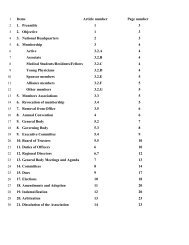functional medicine and nutritional genomics - American Association ...
functional medicine and nutritional genomics - American Association ...
functional medicine and nutritional genomics - American Association ...
Create successful ePaper yourself
Turn your PDF publications into a flip-book with our unique Google optimized e-Paper software.
AAPI’S NUTRITION GUIDE TO OPTIMAL HEALTH: USING PRINCIPLES OF FUNCTIONAL MEDICINE AND NUTRITIONAL GENOMICS<br />
immune response, which can lead to chronic gut<br />
inflammation in susceptible individuals.<br />
DLG5 – Variations in this gene seem to predispose<br />
individuals to what has been coined ‚leaky gut<br />
syndrome‛, thus allowing for intestinal permeability <strong>and</strong><br />
integrity dysfunction.<br />
SLC22A4/SCL22A5 (OCTN1/OCTN2) – Functional<br />
polymorphisms decreasing OCTN activity <strong>and</strong>/or<br />
expression have been associated with chronic<br />
inflammation <strong>and</strong> contribute to CD/IBD pathogenesis.<br />
Specifically, this may be due to reduced carnitine<br />
transport function resulting in impaired fatty acid<br />
metabolism in the gut <strong>and</strong> toxic bacterial metabolites<br />
generated due to reduced ability for proper clearance<br />
of bacterial byproducts.<br />
Current Medical Management<br />
Conventional pharmacological treatment has been<br />
directed towards suppressing inflammation. Typical<br />
drugs used to treat Crohn’s include aminosalicylates<br />
(such as sulfasalazine <strong>and</strong> mesalamine),<br />
corticosteroids (such as prednisone <strong>and</strong> budesonide),<br />
immunosuppressive agents (such as azathioprine, 6mercaptopurine,<br />
methotrexate), <strong>and</strong> antibiotics (57).<br />
More recently, anti-TNF-alpha monoclonal antibodies,<br />
such as infliximab <strong>and</strong> related drugs(Remicade®,<br />
Enbrel®, Humira®) are being prescribed since tumor<br />
necrosis factor appears to play a significant role in the<br />
pathogenesis of CD (58,59). Anti-depressants are<br />
typically offered for assisting with stress management<br />
as stress can also aggravate CD symptoms (60).<br />
Unfortunately, medications used in the therapy of IBD<br />
often contribute to the development of many nutrient<br />
deficiencies. For example, sulfasalazine produces folate<br />
malabsorption by competitive inhibition of the jejunal<br />
folate conjugate enzyme (61). Corticosteroids<br />
suppress small intestinal calcium absorption <strong>and</strong><br />
increase urinary calcium excretion. Cholestyramine,<br />
(which is sometimes used in patients who have<br />
undergone post ileal resection in Crohn's disease to<br />
prevent diarrhea), produces fat, calcium, <strong>and</strong> fatsoluble<br />
vitamin deficiencies. Sulfasalazine, 5aminosalicylic<br />
acid, or metronidazole may cause<br />
93<br />
2012<br />
nausea, vomiting, <strong>and</strong> dyspepsia, which frequently lead<br />
to decreased nutrient intake (62,63).<br />
Nutritional Management<br />
Elemental diets, elimination diets, omega-3 fish oils,<br />
high fiber, low fiber, high protein, low residue diets<br />
<strong>and</strong> bl<strong>and</strong> diets have all been used in one form or<br />
another as part of the <strong>nutritional</strong> management of IBD<br />
(25,64-67). However, <strong>nutritional</strong> protocols have been<br />
inconsistent from one health care facility to another<br />
despite growing research on IBD. Until recently,<br />
theories on <strong>nutritional</strong> management of IBD have been<br />
somewhat disunified.<br />
a. Functional Clinical Tests<br />
A combination of <strong>functional</strong> clinical testing (i.e. an<br />
intestinal permeability assessment, a gut mucosal<br />
assessment or even a comprehensive stool analysis)<br />
combined with genetic testing (ie. Screening for<br />
CARD15/NOD2, DLG5, etc.) could prove to be a<br />
prudent way to identify those at risk of IBD. These<br />
types of intestinal function tests are often single tests<br />
that determine intestinal permeability, imbalances of<br />
intestinal microflora, c<strong>and</strong>idiasis, food allergies <strong>and</strong><br />
immunodeficiencies (68). They can include a sensitive<br />
detection of serum IgA, IgG <strong>and</strong> IgM antibodies using<br />
the ELISA method. (The ELISA (e(nzyme)-l(inked)<br />
i(mmunoad)s(orbent) a(ssay)]method is a sensitive<br />
immunoassay that uses an enzyme linked to an<br />
antibody or antigen as a marker for the detection of a<br />
specific protein, especially an environmental or food<br />
antigen or antibody.) They are recommended for<br />
patients who are suspected of suffering from increased<br />
intestinal permeability <strong>and</strong> malabsorption as seen in<br />
Crohn’s disease, c<strong>and</strong>idiasis, food allergy, chemical<br />
hypersensitivity, fatigue, abnormal immune cell count<br />
<strong>and</strong> function <strong>and</strong> who are at a post-operative stage or<br />
at risk for sepsis (68). These tests provide an<br />
excellent tool for detection of the most common causes<br />
of altered intestinal permeability <strong>and</strong> poor assimilation<br />
of essential nutrients. Various CLIA (clinical laboratory<br />
improvement amendments) certified labs offer these<br />
types of <strong>functional</strong> tests, including Metametrix Clinical<br />
Laboratory, Genova Diagnostics (formerly known as<br />
Great Smokies Diagnostic Laboratory), <strong>and</strong> Doctors<br />
Data, Inc.

















